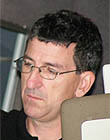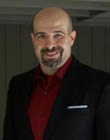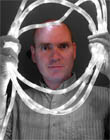|
|
This topic comprises 3 pages: 1 2 3
|
|
Author
|
Topic: Steve Jobs, 1955-2011
|
Michael Coate
Phenomenal Film Handler

Posts: 1904
From: Los Angeles, California
Registered: Feb 2001
|
 posted 10-05-2011 07:13 PM
posted 10-05-2011 07:13 PM




Steve Jobs, 1955-2011
quote:
Steve Jobs Dies: Apple Chief Created Personal Computer, iPad, iPod, iPhone
By NED POTTER (@NedPotterABC) and COLLEEN CURRY
Oct. 5, 2011
Steve Jobs, the mastermind behind Apple's iPhone, iPad, iPod, iMac and iTunes, has died, Apple said. Jobs was 56.
Apple did not reveal where Jobs died or from what cause -- though he has endured a battle with pancreatic cancer in recent years.
"We are deeply saddened to announce that Steve Jobs passed away today," read a statement by Apple's board of directors. "Steve's brilliance, passion and energy were the source of countless innovations that enrich and improve all of our lives. The world is immeasurably better because of Steve. His greatest love was for his wife, Laurene, and his family. Our hearts go out to them and to all who were touched by his extraordinary gifts."
The homepage of Apple's website this evening switched to a full-page image of Jobs with the text, "Steve Jobs 1955-2011."
Clicking on the image revealed the additional text: "Apple has lost a visionary and creative genius, and the world has lost an amazing human being. Those of us who have been fortunate enough to know and work with Steve have lost a dear friend and an inspiring mentor. Steve leaves behind a company that only he could have built, and his spirit will forever be the foundation of Apple."
Jobs co-founded Apple Computer in 1976 and, with his childhood friend Steve Wozniak, marketed what was considered the world's first personal computer, the Apple II.
Shortly after learning of Jobs' death, Wozniak told ABC News, "I'm shocked and disturbed."
Industry watchers called him a master innovator -- perhaps on a par with Thomas Edison -- changing the worlds of computing, recorded music and communications.
In 2004, he beat back an unusual form of pancreatic cancer, and in 2009 he was forced to get a liver transplant. After several years of failing health, Jobs announced on Aug. 24, 2011 that he was stepping down as Apple's chief executive.
"I have always said if there ever came a day when I could no longer meet my duties and expectations as Apple's CEO, I would be the first to let you know," Jobs wrote in his letter of resignation. "Unfortunately, that day has come."
One of the world's most famous CEOs, Jobs remained stubbornly private about his personal life, refusing interviews and shielding his wife and their children from public view.
"He's never been a media person," said industry analyst Tim Bajarin, president of Creative Strategies, after Jobs resigned. "He's granted interviews in the context of product launches, when it benefits Apple, but you never see him talk about himself."
The highlights of Jobs's career trajectory are well-known: a prodigy who dropped out of Reed College in Oregon and, at 21, started Apple with Wozniak in his parents' garage. He was a multimillionaire by 25, appeared on the cover of Time magazine at 26, and was ousted at Apple at age 30, in 1984.
In the years that followed, he went into other businesses, founding NeXT computers and, in 1986, buying the computer graphics arm of Lucasfilm, Ltd., which became Pixar Animation Studios.
He was described as an exacting and sometimes fearsome leader, ordering up and rejecting multiple versions of new products until the final version was just right. He said the design and aesthetics of a device were as important as the hardware and software inside.
In 1996, Apple, which had struggled without Jobs, brought him back by buying NeXT. He became CEO in 1997 and put the company on a remarkable upward path.
By 2001 the commercial music industry was on its knees because digital recordings, copied and shared online for free, made it unnecessary for millions of people to buy compact discs.
Jobs took advantage with the iPod -- essentially a pocket-sized computer hard drive with elegantly simple controls and a set of white earbuds so that one could listen to the hours of music one saved on it. He set up the iTunes online music store, and persuaded major recording labels to sell songs for 99 cents each. No longer did people have to go out and buy a CD if they liked one song from it. They bought a digital file and stored it in their iPod.
In 2007, he transformed the cell phone. Apple's iPhone, with its iconic touch screen, was a handheld computer, music player, messaging device, digital wallet and -- almost incidentally -- cell phone. Major competitors, such as BlackBerry, Nokia and Motorola, struggled after it appeared.
By 2010, Apple's new iPad began to cannibalize its original business, the personal computer. The iPad was a sleek tablet computer with a touch screen and almost no physical buttons. It could be used for almost anything software designers could conceive, from watching movies to taking pictures to leafing through a virtual book.
Personal Life
Jobs kept a close cadre of friends, Bajarin said, including John Lasseter of Pixar and Larry Ellison of Oracle, but beyond that, shared very little of his personal life with anyone.
But that personal life -- he was given up at birth for adoption, had an illegitimate child, was romantically linked with movie stars -- was full of intrigue for his fan base and Apple consumers.
Jobs and his wife, Laurene Powell, were married in a small ceremony in Yosemite National Park in 1991, lived in Woodside, Calif., and had three children: Reed Paul, Erin Sienna and Eve.
He admitted that when he was 23, he had a child out of wedlock with his high school girlfriend, Chris Ann Brennan. Their daughter, Lisa Brennan Jobs, was born in 1978.
He had a biological sister, Mona Simpson, the author of such well-known books as "Anywhere But Here." But he did not meet Simpson until they were adults and he was seeking out his birth parents. Simpson later wrote a book based on their relationship. She called it "A Regular Guy."
Fortune magazine reported that Jobs denied paternity of Lisa for years, at one point swearing in a court document that he was infertile and could not have children. According to the report, Chris Ann Brennan collected welfare for a time to support the child until Jobs later acknowledged Lisa as his daughter.
There were other personal details that emerged over the years, as well.
At Reed, Jobs became romantically involved with the singer Joan Baez, according to Elizabeth Holmes, a friend and classmate. In "The Second Coming of Steve Jobs," Holmes tells biographer Alan Deutschman that Jobs broke up with his serious girlfriend to "begin an affair with the charismatic singer-activist." Holmes confirmed the details to ABC News.
Jobs' Health and Apple's Health
Enigmatic and charismatic, Jobs said little about himself. But then his body began to fail him.
In 2004, he was forced to say publicly he had a rare form of pancreatic cancer. In 2009, it was revealed that he had quietly gone to a Memphis hospital for a liver transplant.
He took three medical leaves from Apple. He did not share details.
In 2009, sources said, members of Apple's board of directors had to persuade him to disclose more about his health as "a fiduciary issue," interwoven with the health of the company.
He was listed in March as 109th on the Forbes list of the world's billionaires, with a net worth of about $8.3 billion. After selling Pixar animation studios to The Walt Disney Company in 2006, he became a Disney board member and the company's largest shareholder. Disney is the parent company of ABC News.
Analysts said Apple performed well during Jobs' absence, partly because he was available for big decisions and partly because his chief lieutenant, Tim Cook, was the hands-on manager even when Jobs was there.
The company has a history of bouncing back. In January 2009, after he announced his second medical leave, Apple stock dropped to $78.20 per share. But it quickly recovered and became one of the most successful stocks on Wall Street. On one day in the summer of 2011, with the stock hitting the $400 level, Apple briefly passed ExxonMobil as the world's most valuable company.
| IP: Logged
|
|
|
|
Brad Miller
Administrator

Posts: 17775
From: Plano, TX (36.2 miles NW of Rockwall)
Registered: May 99
|
 posted 10-06-2011 02:14 AM
posted 10-06-2011 02:14 AM




Comparing Jobs to Edison is absolutely ridiculous. Not even close.
Case in point, Edison is the reason every one of us is here! Only a fraction of the group is here due to Jobs, and at that if Jobs had not been a part of Apple to give it the style that made the company so prosperous, those people would be here anyway on another platform.
What is accurate to say is that if Jobs had not been a part of Apple, Apple would be nothing today. After all Jobs' vision is why when I click on most websites, a picture for example, I have to wait for the box to slide into the frame, the frame to grow larger, and then the picture slowly fade in...as opposed to just displaying the picture immediately. Personally I cannot stand it when "style" gets in the way of productivity, but the success of Apple clearly proves that is what sells and Jobs' vision was dead on target. Full credit must be given to the man for knowing his audience.
I'm betting Apple will not survive in the long haul without him. Apple's future efforts will be no more stylish than Microsoft and other's poor attempts at copying it. Just wait and watch.
| IP: Logged
|
|
|
|
|
|
|
|
Leo Enticknap
Film God

Posts: 7474
From: Loma Linda, CA
Registered: Jul 2000
|
 posted 10-06-2011 05:50 AM
posted 10-06-2011 05:50 AM





quote: Brad Miller
Case in point, Edison is the reason every one of us is here! Only a fraction of the group is here due to Jobs...
To be fair, we are a rather self-selecting group. If this was a Final Cut Pro users' forum, you could possibly reverse that statement (except that the latter would still find Edison's legacy in consumer power supply and electric lighting useful).
quote: Brad Miller
Personally I cannot stand it when "style" gets in the way of productivity, but the success of Apple clearly proves that is what sells and Jobs' vision was dead on target. Full credit must be given to the man for knowing his audience.
There I agree totally. His real achievement was making IT products relevant to people who aren't interested in looking under the bonnet, or understanding the mathematics or electronics of computing. The first (and only, for any significant time) Apple product I used was an Apple II in primary (junior) school, and even then I remember that the applications were designed to be as user-friendly as possible. My father, an IT industry journalist, had an Osborne CP/M machine at the time, and I still remember the difference between the two. The Osborne was monochrome, had no graphics of any description (apart from the ones you could create with combinations of ASCII characters), you had to learn the command line syntax to do anything, and Dad had me programming in MBASIC and Pascal.
Likewise, the kind of people who rave about their Macs and their iPads now would not touch a home-built PC running Linux with a barge pole, and vice-versa. They're different uses of the technology for different people with different objectives.
| IP: Logged
|
|
Hillary Charles
Jedi Master Film Handler

Posts: 748
From: York, PA, USA
Registered: Feb 2001
|
 posted 10-06-2011 07:15 AM
posted 10-06-2011 07:15 AM




quote:
--------------------------------------------------------------------------------
Case in point, Edison is the reason every one of us is here! Only a fraction of the group is here due to Jobs...
--------------------------------------------------------------------------------
To be fair, we are a rather self-selecting group. If this was a Final Cut Pro users' forum, you could possibly reverse that statement (except that the latter would still find Edison's legacy in consumer power supply and electric lighting useful).
And then there would be those contrarians who would suggest that Edison's direct current model was impossibly cumbersome and instead give credit to the Westinghouse/Tesla alternating current system for really getting things going. So many steps and people all leading up to where we are now.
I do agree that Edison's greatest invention was his legend, but if he (or his assistant, W.K.L. Dickson) wasn't the first to project movies, his Patents Company probably was most instrumental in laying the foundation for the motion picture business, however unscrupulous it operated back then.
Naturally, when someone like Jobs dies, people do go overboard with effusive praise. My favorite commentary was a photo posted on facebook of a couple of the Wall Street protestors rallying against Capitalism...using an Ipad.
| IP: Logged
|
|
|
|
|
|
|
|
|
|
|
|
|
|
|
|
|
|
All times are Central (GMT -6:00)
|
This topic comprises 3 pages: 1 2 3
|
Powered by Infopop Corporation
UBB.classicTM
6.3.1.2
The Film-Tech Forums are designed for various members related to the cinema industry to express their opinions, viewpoints and testimonials on various products, services and events based upon speculation, personal knowledge and factual information through use, therefore all views represented here allow no liability upon the publishers of this web site and the owners of said views assume no liability for any ill will resulting from these postings. The posts made here are for educational as well as entertainment purposes and as such anyone viewing this portion of the website must accept these views as statements of the author of that opinion
and agrees to release the authors from any and all liability.
|

 Home
Home
 Products
Products
 Store
Store
 Forum
Forum
 Warehouse
Warehouse
 Contact Us
Contact Us




 Printer-friendly view of this topic
Printer-friendly view of this topic
















![[Roll Eyes]](rolleyes.gif)



